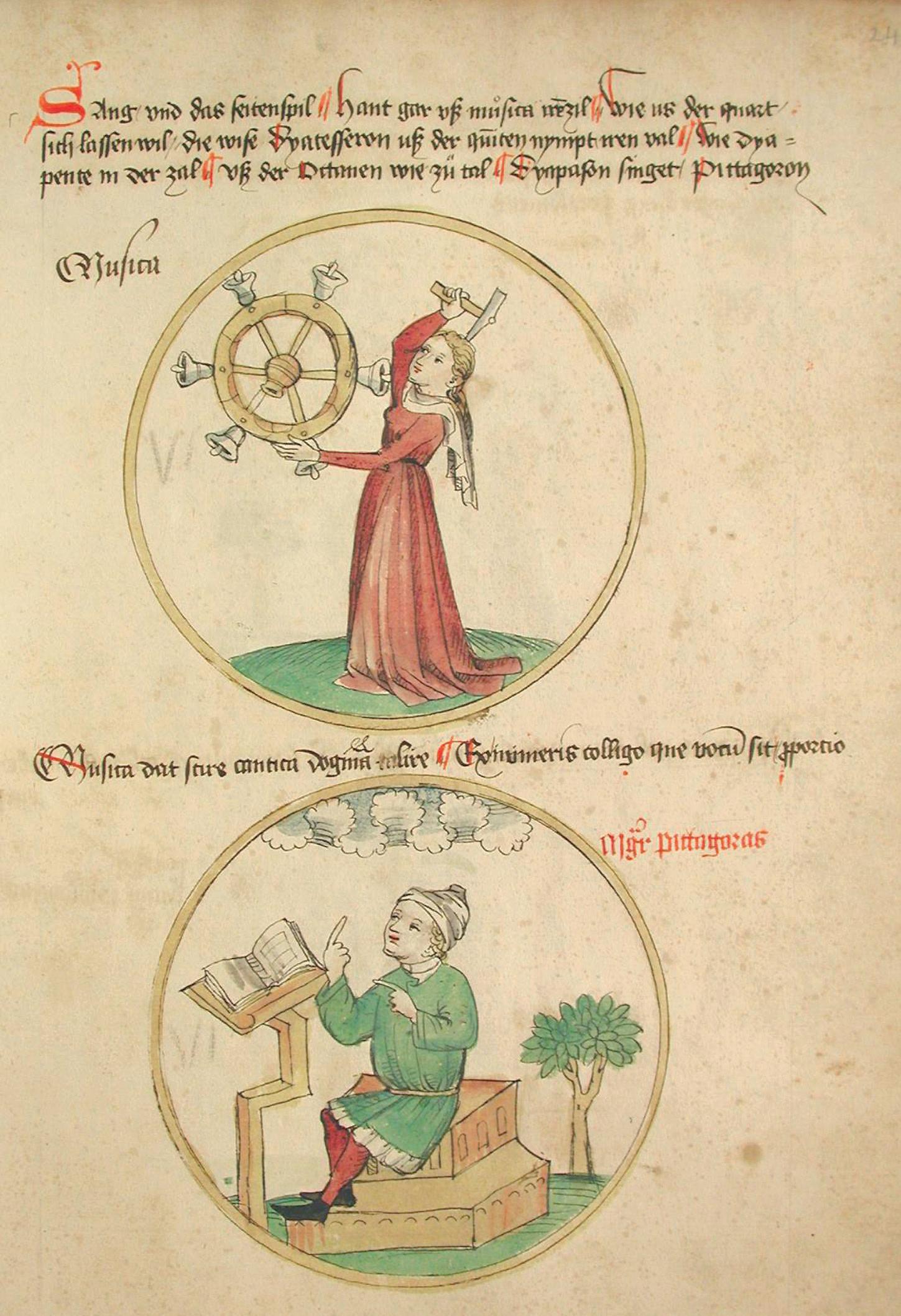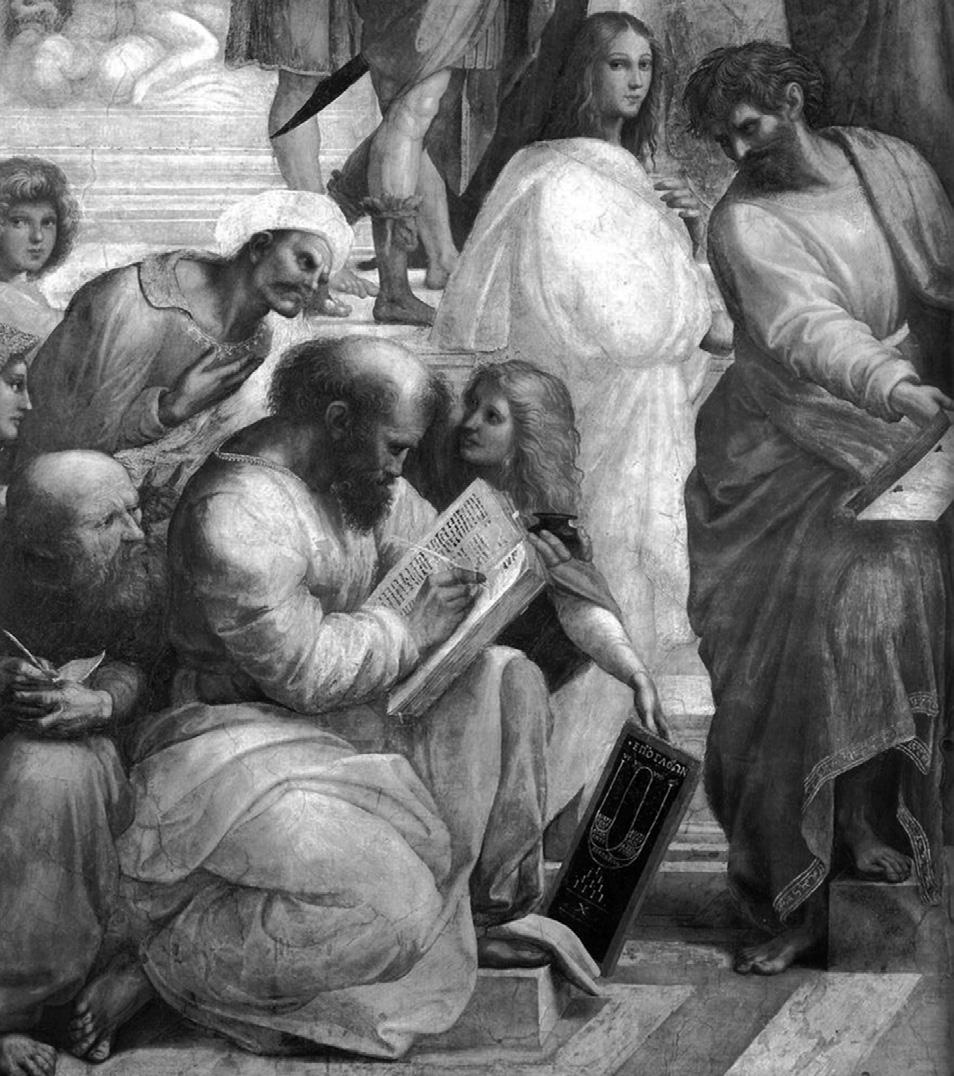
9 minute read
the golden verses of pythagoras
ancient wisdom for a practical present
THE GOLDEN VERSES OF PYTHAGORAS
Advertisement
De oude wijsheid beeldt Pythagoras vaak zittend af, wijzend naar de hemel. De wijsgeer en wiskundige wordt in nauw verband gebracht met de muziek, die immers net als de hemellichamen in het universum door maat en getal wordt bepaald. Salzburger verzamelmanuscript M III 35/36
ancient wisdom for a practical present
Pythagoras lived two and a half thousand years ago in Greece, in the colony currently known as Sicily. Often, Pythagoras is mentioned in the same breath with Hermes, Zarathustra and Plato, and he is counted among the greatest philosophers. From him stems the word philosophy: love of wisdom. In his view, a person should rst of all strive for purity of the soul. This will automatically be the result, if he has respect for everything that lives and thinks about the universe, in which order and harmony rule. Myriads of developments take place there through natural growth and with their own rhythm and speed. In this majestic, macrocosmic whole, number, numeric values and relationships determine everything that appears.
There is a legend about Pythagoras that he could be in more than one place at the same time. Metaphorically, this certainly might still be said nowadays, because the in uences of his philosophy are present everywhere: in philosophy, ethics, astronomy, music and mathematics. The combination of music and astronomy can be found in the expression ‘the music of the spheres’. Shakespeare says about it in The Merchant of Venice: ‘Sit, Jessica. Look how the oor of heaven is thick inlaid with patines of bright gold: There’s not the smallest orb which thou behold’st but in his motion like an angel sings, still quiring to the young-eyed cherubins. Such harmony is in immortal souls. But whilst this muddy vesture of decay doth grossly close it in, we cannot hear it.’
The Pythagoreans formed communities with certain rules of life, of which only a few external aspects have been passed down, albeit, taken out of context. According to Dicaearchus, Pythagoras taught that the soul is immortal; that everything that comes into being is reborn in the turning of the times and according to a certain cycle; that consequently, nothing is wholly new and; that everything that is born alive is mutually related, because this is what they have in common: life. Men and women joined the Pythagorean School on an equal footing. All possessions were communal and they lived in communities. Even discoveries in the eld of music, mathematics or astrosophy were considered common property and were, in a mystical sense, attributed to Pythagoras, even after his death. In the ethics of the Pythagoreans, the contemplative life was most important. ‘We are strangers in this world and the body is the tomb of the soul. Yet, we should not try to escape by suicide, because we are part and parcel of God. He is our keeper and if he does not command us to do so, we should not escape life. There are three types of people in this life, just as there are also three types of visitors of the Olympic Games. The lowest type is those who come to trade; the next type is those who participate in the competitions, but the highest are the spectators. Therefore, the highest puri cation is unselfish wisdom and science, and the human being who devotes himself to it, that is, the true philosopher, will liberate himself most e ectively from the wheel of birth.’
The Pythagoreans led a life of asceticism and abstinence. Respect for life was the central issue; they followed a vegetarian diet; they also abolished the sacri cing of animals to the gods. In this way, Pythagoras became the founder of the vegetarian way of life in Europe. Until the second half of the 19th century, someone, who abstained from meat and animal products, was called a Pythagorean; only later, the word vegetarian was introduced. www.stichtingpythagoras.nl
The word ‘theory’, the modern philosopher Bertrand Russell says, is originally an ‘orphic’ word, that is, a concept stemming from mystical-religious movements and teachings in antiquity that considered the soul a divine attribute, which is liberated from the body through a series of incarnations. This word may be interpreted as ‘passionate, sympathetic contemplation’. A ‘theory’ might lead to mathematical knowledge or deep insight. Thus the word ‘theory’ gradually acquired its current meaning via the Pythagoreans, but for all those, who were inspired by Pythagoras, it retained an element of ecstatic revelation. To all who grudgingly learned a little mathematics in school, this may seem strange. However, to those who have experienced anything of the ecstasy of ‘insight’, like for instance the sudden insight that mathematics sometimes grants, but certainly also insight into the path of liberation, will wholly recognise Pythagoras’ ideas.
Of Pythagoras’ rules of life, amongst other things, The Golden Verses of Pythagoras have been passed down, but the text is hard to nd. This is why we would like to present a few fragments of this transmitted wisdom. THE GOLDEN VERSES OF PYTHAGORAS
First worship the immortal gods, as they are established and ordained by the law. Reverence the oath, and next the heroes, full of goodness and light. […] Honour likewise your parents, and those most nearly related to you. Of all the rest of mankind, make him your friend who distinguishes himself by his virtue. Always give ear to his mild exhortations, and take example from his virtuous and useful actions. Avoid as much as possible hating your friend for a slight fault. Power is a near neighbour to necessity. Know that all these things are as I have told you; and accustom yourself to overcome and vanquish these passions: First gluttony, sloth, sensuality, and anger. Do nothing evil, neither in the presence of others, nor privately; but above all things respect yourself. In the next place, observe justice in your actions and in your words. And accustom yourself not to behave yourself in any thing without rule, and without reason. But always make this re ection, that it is ordained by destiny that all men shall die, and that the goods of fortune are uncertain; and that as they may be acquired, so may they likewise be lost.
Concerning all the calamities that men suffer by divine fortune: support with patience your lot, be it what it may, and never repine at it, but endeavour what you can to remedy it.
And consider that fate does not send the greatest portion of these misfortunes to good men. There are among men many sorts of reasonings, good and bad; admire them not too easily, nor reject them. But if falsehoods be advanced, hear them with mildness, and arm yourself with patience. Observe well, on every occasion, what I am going to tell you: let no man either by his words, or by his deeds, ever seduce you, nor entice you to say or to do what is not pro table for yourself. Consult and deliberate before you act, that you may not commit foolish actions, for it is the part of a miserable man to speak and to act without re ection. But do that which will not af ict you afterwards, nor oblige you to repentance. Never do anything which you do not understand; but learn all you ought to know, and by that means you wilt lead a very pleasant life.
In no wise neglect the health of your body, but give it drink and meat in due measure, and also the exercise of which it has need.
Now by measure, I mean what will not incommode you.
Accustom yourself to a way of living that is neat and decent without luxury. Avoid all things that will occasion envy. And be not prodigal out of season, like one who knows not what is decent and honourable. Neither be covetous nor niggardly; a due measure is excellent in these things. Do only the things that cannot hurt you, and deliberate before you do them.
Never suffer sleep to close your eyelids, after your going to bed, till you have examined by your reason all your actions of the day. Wherein have I done amiss? What have I done? What have I omitted that I ought to have done? If in this examination, you nd that you have done amiss, reprimand yourself severely for it; and if you have done any good, rejoice. Practise thoroughly all these things; meditate on them well; you ought to love them with all your heart. It is they that will put you in the way of divine virtue. I swear it by him who has transmitted into our souls the ‘Sacred Quaternion’, the source of nature, whose cause is eternal. But never begin to set your hand to any work, till you have rst prayed the gods to accomplish what you are going to begin. When you have made this habit familiar to you, you will know the constitution of the immortal gods and of men. Even how far the different beings extend, and what contains and binds them together. You shall likewise know that according to law, the nature of this universe is in all things alike, so that you shall not hope what you ought not to hope; and nothing in this world shall be hidden from you. You will likewise know, that men draw upon themselves their own misfortunes voluntarily,
and of their own free choice. Unhappy that they are! They neither see nor understand that their good is near them. Such is the fate that blinds mankind, and takes away his senses. Like huge cylinders they roll to and fro, and always oppressed with ills innumerable. For fatal strife, innate, pursues them everywhere, tossing them up and down; nor do they perceive it. Instead of provoking and stirring it up, they ought, by yielding, to avoid it. Oh! Jupiter, our Father! If You would deliver men from all the evils that oppress them, show them of what demon they make use. But take courage; the race of man is divine. Sacred nature reveals to them the most hidden mysteries. If she impart to you her secrets, you will easily perform all the things which I have ordained you. And by the healing of your soul, you will deliver it from all evils, from all af ictions. But abstain from the meats, which we have forbidden in the puri cations and in the deliverance of the soul. Make a just distinction of them, and examine all things well. Leaving yourself always to be guided and directed by the understanding that comes from above, and that ought to hold the reins. And when, after having divested yourself of your mortal body, you arrive at the most pure ether, you shall be a God, immortal, incorruptible, and death shall have no more dominion over you µ









